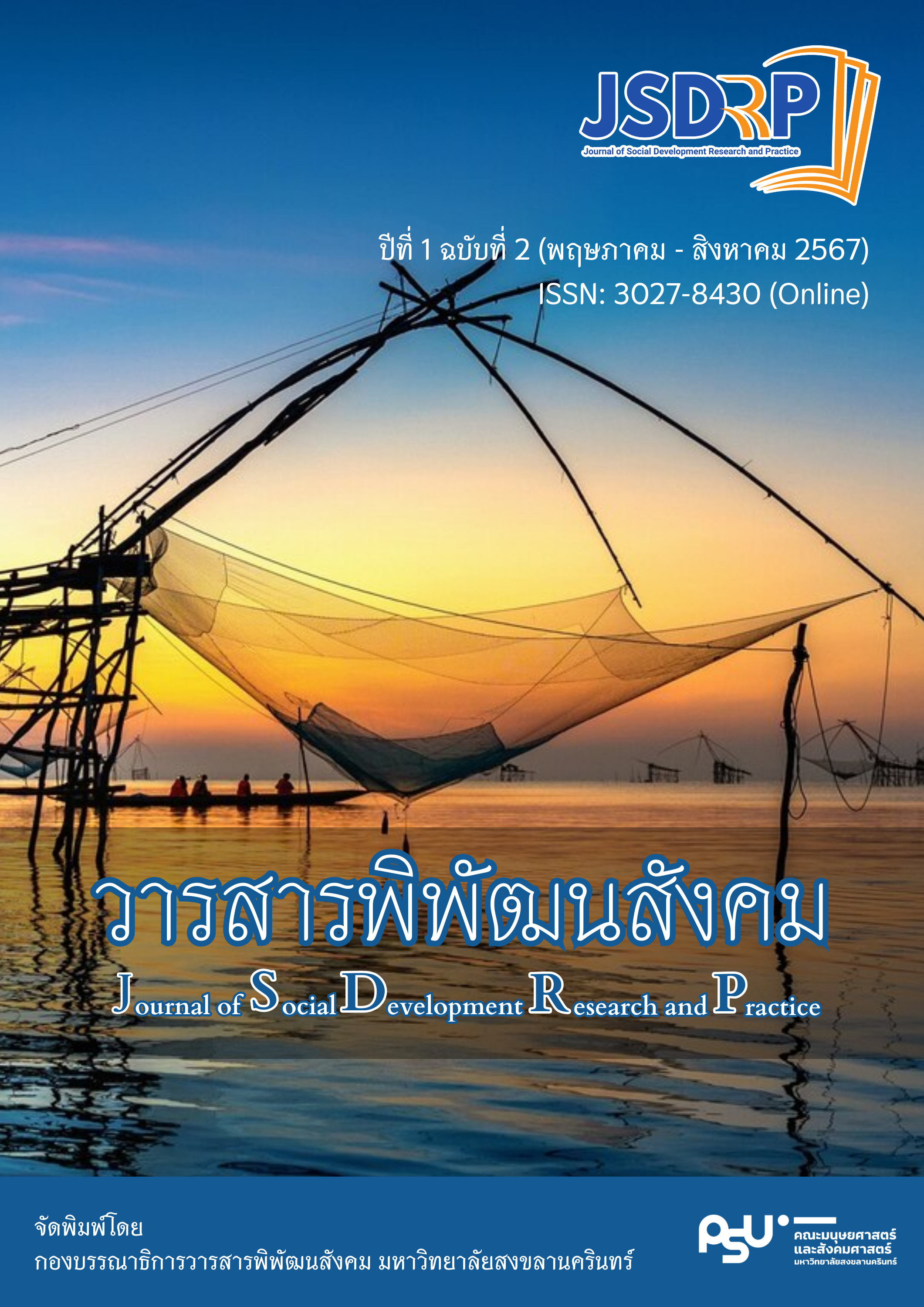การประเมินผลตอบแทนทางสังคม (SROI) ผ่านการท่องเที่ยวชุมชน เสริมพลังความเป็นไปได้ในการแก้ปัญหาครัวเรือนยากจน
คำสำคัญ:
การประเมินผลตอบแทนทางสังคม, ท่องเที่ยวชุมชน, การแก้ปัญหา, ครัวเรือนยากจนบทคัดย่อ
วัตถุประสงค์: เพื่อการประเมินผลตอบแทนทางสังคม (SROI) ผ่านแต่ละกิจกรรมที่เกี่ยวข้องกับการท่องเที่ยวชุมชน โดยใช้พื้นที่ตำบลเกาะหมาก อำเภอปากพะยูน จังหวัดพัทลุง เป็นพื้นที่ต้นแบบ ผลศึกษาจะเป็นข้อมูลสำคัญให้ชุมชนใช้ในการพัฒนาการท่องเที่ยว และเป็นส่วนสำคัญต่อการวางนโยบายและการบริหารจัดการการท่องเที่ยวโดยชุมชนให้ยั่งยืนบนฐานทรัพยากรของชุมชนที่อยู่
วิธีการศึกษา: ประชากรและกลุ่มตัวอย่างจากกลุ่มท่องเที่ยวชุมชนเกาะหมาก 30 คน เครือข่ายท่องเที่ยวชุมชนพัทลุง 10 คน กลุ่มชาวประมง 10 คน กลุ่มสตรี 30 คน และกลุ่มเปราะบางของครัวเรือนยากจน 100 คน ใช้วิธีแบบเฉพาะเจาะจงร่วมกับแบบบอกต่อ โดยใช้วิธีการสัมภาษณ์และใช้ Microsoft Excel การเงินและการบัญชีขั้นพื้นฐานในการจัดทำการประเมินผลตอบแทนทางสังคม (SROI)
ข้อค้นพบ: การวัดผลกระทบทางสังคมของโครงการ โดยการประเมินแบบ Ex-post Evaluation หลังจากโครงการได้ดำเนินการเสร็จสิ้น โครงการได้สร้างมูลค่าผลประโยชน์ปัจจุบันสุทธิที่เกิดขึ้นแก่สังคม 1,979,260.94 บาท ต้นทุนของโครงการคือ 1,000,000 บาท มูลค่าปัจจุบันของผลประโยชน์สุทธิ (NPV) 979,260.94 ผลตอบแทนทางสังคมจากการลงทุน (SROI) คิดเป็น 1.98 เท่า และมีอัตราผลตอบแทนภายใน (IRR) คิดเป็น 67.27%
การประยุกต์ใช้จากการศึกษานี้: การดำเนินโครงการที่เน้นการบริหารจัดการที่ดี การใช้ทรัพยากรอย่างมีประสิทธิภาพ และการสร้างโอกาสในการพัฒนาชุมชนอย่างยั่งยืน เป็นปัจจัยช่วยให้โครงการประสบความสำเร็จ และมีผลกระทบเชิงบวกต่อคุณภาพชีวิตของคนจนในพื้นที่ได้อย่างเป็นรูปธรรม
Downloads
เอกสารอ้างอิง
เกรียงศักดิ์ ยุทโท, นิโรจน์ สินณรงค์, ธรรญชนก เพชรานนท์ และกฤตวิทย์ อัจฉริยะพานิช. (2566). การวิเคราะห์ผลตอบแทนทางสังคม กรณีศึกษาการพัฒนาการเรียนรู้การแพทย์ฉุกเฉินพื้นที่จังหวัดเชียงราย. วารสารวิจัยวิทยาการจัดการ มหาวิทยาลัยราชภัฏสุรินทร์, 7(2), 140-153.
เกศกุล สระกวี, เศรษฐภูมิ บัวทอง, บุญฤทธิ์ พานิชเจริญ และนูรีมะห์ ลูดิง. (2560). โครงการจ้างที่ปรึกษาวิเคราะห์ผลลัพธ์ทางสังคม (Social Impact Assessment – SIA) จากการพัฒนาการท่องเที่ยวโดยชุมชน ประจำปีงบประมาณ พ.ศ. 2564 องค์การบริหารการพัฒนาพื้นที่พิเศษเพื่อการท่องเที่ยวอย่างยั่งยืน (องค์การมหาชน) (รายงานการวิจัย). กรุงเทพฯ: สำนักงานศูนย์วิจัยและให้คำปรึกษาแห่งมหาวิทยาลัยธรรมศาสตร์.
ดนวัต สีพุธสุข, วีณา ลีลาประเสริฐศิลป์, พัฒนา ศิริกุลพิพัฒน์ และวิลาสินี ธนพิทักษ์. (2567) สถานการณ์ความยากจน และกลไกการท่องเที่ยวเชิงชุมชนโดยใช้ครัวเรือนยากจนเป็นฐานในอำเภอปากพะยูน จังหวัดพัทลุง. วารสารพิพัฒนสังคม, 1(1), 16-30.
ทัศนีย์ นาคเสนีย์, รุจิรา แสงแข และอมรพิมล พิทักษ์. (2565). ผลตอบแทนทางสังคมจากการดำเนินธุรกิจวิสาหกิจชุมชนเพื่อส่งเสริมการท่องเที่ยวกีฬาในการจัดงานวิ่งจอมบึงมาราธอน กรณีศึกษาศูนย์การเรียนรู้อยู่เย็นเป็นสุข วิถีไทยรามัญ. วารสารลวะศรี มหาวิทยาลัยราชภัฏเทพสตรี, 6(1), 88-105.
พชร ชำนาญไพร. (2561). การวัดผลตอบแทนทางสังคมจากการลงทุนในธุรกิจเพื่อสังคมของศูนย์การเรียนรู้ เพาะฟักลูกปู (วิทยานิพนธ์บัญชีมหาบัณฑิต). กรุงเทพฯ: มหาวิทยาลัยธรรมศาสตร์.
พรพิมล อริยะวงษ์. (2564). การประเมินผลตอบแทนทางสังคมจากการลงทุน (SROI) เพื่อสร้างความยั่งยืนของกลุ่มทอผ้ากี่กระตุกไหล่หินตะวันตก อำเภอเกาะคา จังหวัดลำปาง. วารสารด้านการบริหารรัฐกิจและการเมือง, 10(2), 147-166.
วัชนีพร เศรษฐสักโก และสิริพงศ์ กันธิยะ. (2563). ผลตอบแทนทางสังคมจากการลงทุน กรณีศึกษาโรงแรมรักษ์สิ่งแวดล้อมในประเทศไทย. วารสารวิชาชีพบัญชี, 16(50), 5-22.
เศรษฐภูมิ บัวทอง, เกศกุล สระกวี และบุญฤทธิ์ พานิชเจริญ. (2564). คู่มือการประเมินผลกระทบทางสังคม (Social Impact Assessmet : SIA) และผลตอบแทนทางสสังคมจากการลงทุน (Social Return On Investmennt : SROI) โครงการเพื่อสังคม. ปทุมธานี: วิทยาลัยพัฒนศาสตร์ ป๋วย อึ๊งภากรณ์.
สฤณี อาชวานันทกุล และภัทราพร แย้มลออ. (2557). คู่มือการประเมินผลลัพธ์ทางสังคม (Social Impact Assessment) และผลตอบแทนทางสังคมจากการลงทุน (Social Return on Investment: SROI). กรุงเทพฯ: มหาวิทยาลัยธรรมศาสตร์.
องค์การบริหารการพัฒนาพื้นที่พิเศษเพื่อการท่องเที่ยวอย่างยั่งยืน. (2558). ท่องเที่ยวโดยชุมชน: งานองค์ความรู้ สำนักบริหารยุทธศาสตร์ ร่วมกับสำนักท่องเที่ยวโดยชุมชน องค์การบริหารการพัฒนาพื้นที่พิเศษเพื่อการท่องเที่ยวอย่างยั่งยืน (องค์การมหาชน). กรุงเทพฯ: บริษัท โคคูน แอนด์ โค จำกัด.
อัครพงศ์ อั้นทอง และอริยา เผ่าเครื่อง. (2563). ทุนของชุมชนและผลตอบแทนทางเศรษฐกิจของการท่องเที่ยวโดยชุมชน เกาะยาวน้อย จังหวัดพังงา. วารสารเศรษฐศาสตร์และกลยุทธ์การจัดการ, 8(1), 1-18.
SDG MOVE. (2565). การท่องเที่ยวอย่างยั่งยืน. สืบค้นเมื่อ 8 กรกฎาคม 2567 จาก https://www.sdgmove.com/2021/07/31/sdg-vocab-41-sustainable-tourism
SROI Network. (2012). A guide to Social Return on Investment. Retrieved 2 July 2024, from https://static1.squarespace.com/static/60dc51e3c58aef413ae5c975/t/60f7fa286b9c6a47815bc3b2/1626864196998/The-SROI-Guide-2012.pdf
ดาวน์โหลด
เผยแพร่แล้ว
รูปแบบการอ้างอิง
ฉบับ
ประเภทบทความ
สัญญาอนุญาต
ลิขสิทธิ์ (c) 2024 วารสารพิพัฒนสังคม

อนุญาตภายใต้เงื่อนไข Creative Commons Attribution-NonCommercial-NoDerivatives 4.0 International License.
This work is licensed under a Creative Commons Attribution-NonCommercial-NoDerivatives 4.0 International License.





